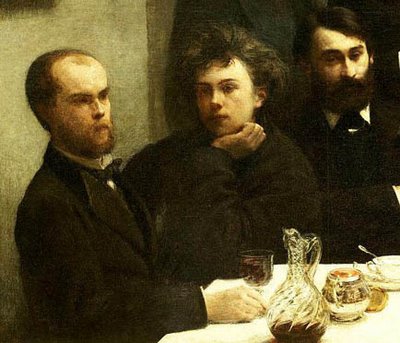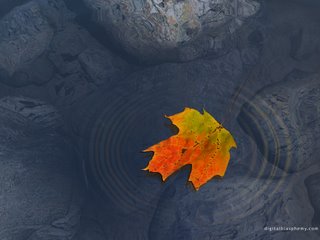~ John Keats

ODE ALLA MALINCONIA
1
No, no, non precipitarti verso il Lete; non trarre vino velenoso
Dall'aconito, torcendo le sue saldi radici, no
Non lasciare che la tua pallida fronte sia baciata
Dal rosso grappolo di Proserpina, la belladonna;
No, il tuo rosario non fare con le bacche del tasso,
Né la tua lamentosa Psiche siano lo scarabeo
O la falena della morte; non condividere
Col gufo piumato i misteri del tuo dolore,
Che troppo assonnata l'ombra verrà all'ombra
Ad annegare la vigile angoscia dell'animo.
2
Ma quando dal cielo improvviso l'attacco cadrà
Di malinconia, come una nuvola in pianto
Che tutti i fiori nutre dal languido capo
E il verde colle nasconde in un sudario d'aprile,
Sazia allora il tuo dolore con una rosa mattutina,
Sazialo con l'arcobaleno dell'onda salata di sabbia
O con la ricchezza delle tonde peonie.
E quando mostri la tua amante una ricca ira,
La sua dolce mano imprigiona; lasciala delirare
Mentre tu ti nutri e ti sazi dai suoi occhi senza pari.
3
Sì, abita con la bellezza, lei, con la bellezza che deve morire;
E con la Gioia, che sempre una mano tiene sulle labbra
Per augurare addio: e vicino alò Piacere, che fa soffrire,
E si tramuta in veleno mentre come un'ape succhia la bocca:
Sì, nel tempio stesso del Diletto
Ha il suo santuario sovrano la velata Melanconia,
Anche se nessuno la scorge se non quello la cui strenua lingua
Schiaccia il grappolo della Gioia sul palato da intenditore:
Assaggerà allora l'anima sua la tristezza di quel potere
Che la farà rimanere sospesa tra i suoi nebulosi trofei.
~ ~ ~ ~ ~
ODE TO MELANCHOLY
1
NO, no, go not to Lethe, neither twist
Wolf's-bane, tight-rooted, for its poisonous wine;
Nor suffer thy pale forehead to be kiss'd
By nightshade, ruby grape of Proserpine;
Make not your rosary of yew-berries,
Nor let the beetle, nor the death-moth be
Your mournful Psyche, nor the downy owl
A partner in your sorrow's mysteries;
For shade to shade will come too drowsily,
And drown the wakeful anguish of the soul.
2
But when the melancholy fit shall fall
Sudden from heaven like a weeping cloud,
That fosters the droop-headed flowers all,
And hides the green hill in an April shroud;
Then glut thy sorrow on a morning rose,
Or on the rainbow of the salt sand-wave,
Or on the wealth of globed peonies;
Or if thy mistress some rich anger shows,
Emprison her soft hand, and let her rave,
And feed deep, deep upon her peerless eyes.
3
She dwells with Beauty--Beauty that must die;
And Joy, whose hand is ever at his lips
Bidding adieu; and aching Pleasure nigh,
Turning to poison while the bee-mouth sips:
Ay, in the very temple of Delight
Veil'd Melancholy has her sovran shrine,
Though seen of none save him whose strenuous tongue
Can burst Joy's grape against his palate fine;
His soul shalt taste the sadness of her might,
And be among her cloudy trophies hung.
ODE A UN'URNA GRECA
Tu della quiete ancora inviolata sposa,
alunna del silenzio e del tempo tardivo,
narratrice silvestre che un racconto
fiorito puoi così più che la nostra
rima dolcemente dire,
quale leggenda adorna d'aeree fronde si posa
intorno alla tua forma?
Di deità, di mortali o pur d'entrambi,
in Tempe o nelle valli
d'Arcadia? Quali uomini
son questi o quali dei,
quali ritrose vergini,
qual folle inseguimento, qual paura,
quali zampogne e timpani,
quale selvaggia estasi?
Dolci le udite melodie: più dolci le non udite.
Dunque voi seguite, tenere cornamuse,
il vostro canto, non al facile senso, ma,
più cari, silenziosi concenti date all'intimo cuore.
Giovine bello, alla fresca ombra mai può il tuo canto languire,
né a quei rami venir meno la fronda.
Audace amante e vittorioso, mai mai tu potrai baciare,
pur prossimo alla meta, e tuttavia non darti affanno:
ella non può sfiorire e, pur mai pago,
quella per sempre tu amerai, bella per sempre.
O fortunate piante cui non tocca perder le belle foglie,
né, meste, dire addio alla primavera;
te felice, cantore non mai stanco
di sempre ritrovare canti per sempre nuovi;
ma, più felice Amore!
fervido e sempre da godere, e giovane e anelante sempre,
tu che di tanto eccedi ogni vivente passione umana,
che in cuore un solitario dolore lascia, e sdegno: amara febbre.
Chi son questi venienti al sacrificio?
E, misterioso sacerdote, a quale verde altare conduci questa,
che mugghia ai cieli, mite giovenca
di ghirlande adorna i bei fianchi di seta?
Qual piccola città, presso del fiume o in riva al mare costruita,
o sopra il monte, fra le sue placide mura,
si è vuotata di questa folla festante, in questo pio mattino?
Tu, piccola città, quelle tue strade sempre saranno silenziose
e mai non un'anima tornerà che dica perché sei desolata.
O pura attica forma! Leggiadro atteggiamento,
cui d'uomini e fanciulle e rami ed erbe calpestate
intorno fregio di marmo chiude,
invano invano il pensier nostro ardendo fino a te si consuma,
pari all'eternità, fredda, silente, imperturbabile effige.
Quando, dal tempo devastata e vinta,
questa or viva progenie anche cadrà,
fra diverso dolore, amica all'uomo,
rimarrai tu sola, "Bellezza è Verità"
dicendo ancora: "Verità è Bellezza".
Questo a voi, sopra la terra, di sapere è dato:
questo, non altro, a voi, sopra la terra,
è bastante sapere.
~ ~ ~ ~ ~
ODE ON A GRECIAN URN
Thou still unravish'd bride of quietness,
Thou foster-child of silence and slow time,
Sylvan historian, who canst thou express
A flowery tale more sweetly than our rhyme:
What leaf-fring'd legend haunt about thy shape
Of deities or mortals, or of both,
In Tempe or the dales of Arcady?
What men or gods are these? What maidens loth?
What mad pursuit? What struggle to escape?
What pipes and timbrels? What wild ecstasy?
Heard melodies are sweet, but those unheard
Are sweeter: therefore, ye soft pipes, play on;
Not to the sensual ear, but, more endear'd,
Pipe to the spirit ditties of no tone:
Fair youth, beneath the trees, thou canst not leave
Thy song, nor ever can those trees be bare;
Bold lover, never, never canst thou kiss,
Though winning near the goal - yet, do not grieve;
She cannot fade, though thou hast not thy bliss,
For ever wilt thou love, and she be fair!
Ah, happy, happy boughs! that cannot shed
Your leaves, nor ever bid the spring adieu;
And, happy melodist, unwearied,
For ever piping songs for ever new;
More happy love! more happy, happy love!
For ever warm and still to be enjoy'd,
For ever panting, and for ever young;
All breathing human passion far above,
That leaves a heart high-sorrowful and cloy'd,
A burning forehead, and a parching tongue.
Who are these coming to the sacrifice?
To what green altar, O mysterious priest,
Lead'st thou that heifer lowing at the skies,
And all her silken flanks with garlands drest?
What little town by river or sea shore,
Or mountain-built with peaceful citadel,
Is emptied of this folk, this pious morn?
And, little town, thy streets for evermore
Will silent be; and not a soul to tell
Why thou art desolate, can e'er return.
O Attic shape! Fair attitude! with brede
Of marble men and maidens overwrought,
With forest branches and the trodden weed;
Thou, silent form, dost tease us out of thought
As doth eternity: Cold Pastoral!
When old age shall this generation waste,
Thou shalt remain, in midst of other woe
Than ours, a friend to man, to whom thou say'st,
"Beauty is truth, truth beauty," - that is all
Ye know on earth, and all ye need to know.
Etichette: malinconia, poesia
 ...e tu?
...e tu?




































